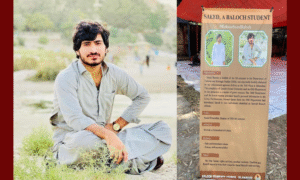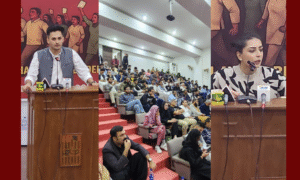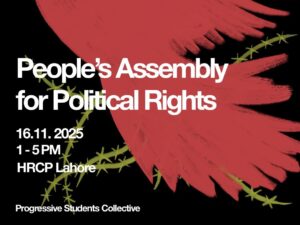The increasingly repressive and callous attitude of state institutions has failed the youth of this country
Our state authorities have a rather sordid history of confronting students. In a population of 220 million, where youth make up 65 pc of the total, the approach in practice is outright ridiculous. Rendering more than half a population at the mercy of law enforcement agencies, the state continues to designate them as a law and order situation instead of addressing them as politically conscious youth countering extremists’ hegemony in and outside campuses.
This was demonstrated again last month as police went prowling into Punjab University’s hostels arresting dozens of Pashtun, Baloch, and Seraiki students after administration-backed goons of Islami Jamiat Talba launched a vicious attack against them. Chairman Pashtoon Education Development Movement PEDM, Riaz Khan, was arrested as well. The highlight of this half-witted venture featured Punjab police putting behind bars the President and Vice President of Progressive Students’ Collective, Qaiser Javed and Ali Raza, for visiting the arrested students. IJT’s growing violence against progressive voices and ethnically diverse students has become a routine inside campuses. Yet the administration finds it easy to prey on the victims.
This incident was an ugly reminder of the position of students in our state. Instead of treating them as assets, speaking up, and protesting against the horrendous crimes of the state, authorities fear them more than the Talibans across the border. It seems they would rather negotiate with the armed men – and later, become their unsolicited spokespersons- than pay heed to their own grieving citizens. With less than 1% of the population enrolled in higher education institutions, Pakistan has a strikingly low student base. And when this literate and politically aware class of youth actively take part in their society, raising voices against stark inequalities, administrative mismanagements, budding extremism, and enforced disappearances of their fellow students, they are booked on sedition charges against the state.
It seems they would rather negotiate with the armed men – and later, become their unsolicited spokespersons- than pay heed to their own grieving citizens.
A politically vibrant student base is the hallmark of participatory democracy. Students, throughout history, have played a tremendous role in sustaining democratic practices, overthrowing fascist regimes, and securing rights for the masses. Nations treasure their future scholars, philosophers, scientists, and intellectuals. Unfortunately, this is not the case in Pakistan. The stunning intellect and political understanding displayed by our students have intimidated the state which has time and again been found guilty of heinous crimes against its citizenry. This particularly rings true for youth from the peripheral areas who come to bigger cities in search of better educational opportunities but are illegally abducted, tortured, and detained by intelligence agencies.
Human Rights Commission of Pakistan as well as international watchdogs like Amnesty International have been pleading before successive governments to criminalize enforced disappearances and produce abducted students before civil courts if they do have just charges against them, but all fall on deaf ears. In a state of affairs, where the missing persons’ bill gets missing itself and is later revealed to be shunned on the behest of the supreme intelligence agency of the country as admitted by former Human Rights Minister Shireen Mazari, the future of democracy seems bleak. Those at the top have nothing to lose if things go out of hand; the masses, like always, will bear the brunt of the situation. As a student of Punjab University, I have seen an enormous potential in our youth to lead the way towards a more tolerant, ecologically secure, and people-friendly system of governance that stands on ideals of equality and participation.
A crumbling economy, worsening climate-change impacts, surging polarization combined with the threat of an impending civil war, as well as looming frustration among the populace calls for the state to reevaluate its role in the making of this crisis. The students, on the other hand, continue to educate themselves with analysis-intensive study circles, holdong rallies in and outside campuses, staging sit-ins and spreading awareness around these issues. Only if the state had taken notes in time, we wouldn’t have been stuck in this mess in the first place.




